Generic Medicines
Taj Pharma is the largest generic pharmaceutical company in India. We hold top positions in different established markets worldwide generics markets..

It's been 20 years since William Campbell visited the small nation of Togo in western Africa. But he still vividly recalls the remote communities he visited, with their tiny mud-thatched huts and trees so large that an entire village of 100 could gather under the leafy canopies.
Togo, a narrow strip of land on Africa's west coast, has for years been the target of criticism over its human rights record and political governance.
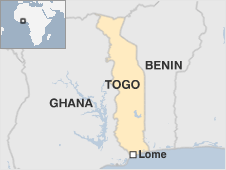 |
Tensions spilled over into deadly violence when its strong-arm, veteran leader died in 2005 and a succession crisis followed. Political reconciliation remains elusive.
Togo formed part of the Slave Coast, from where captives were shipped abroad by European slavers during the 17th century. In 1884 it became the German protectorate of Togoland.
AT-A-GLANCE
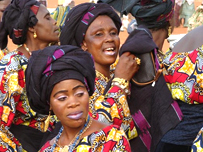 Politics: President Faure Gnassingbe succeeded his father in a manner condemned internationally. The opposition and government have agreed to form a government of national unity
Economy: Togo is among the world's poorest countries. Isolation has further aggravated its weak economy
International: Togo faces international pressure to hold credible parliamentary elections and improve its human rights record. Thousands who fled 2005 election violence remain in Benin
|
It was seized by Britain and France at the start of World War I, divided and administered under League of Nations mandates.
The British-ruled western part was later incorporated into what is now Ghana.
France granted independence in 1960 and Togo's first president, Sylvanus Olympio, was assassinated in a military coup three years later. Head of the armed forces Gnassingbe Eyadema seized power in a 1967 coup and dissolved all political parties.
Although political parties were legalised in 1991 and a democratic constitution was adopted in 1992, the leadership was accused of suppressing opposition and of cheating in elections.
A joint UN-Organisation of African Unity investigation into claims that hundreds of people were killed after controversial elections in 1998 concluded that there had been systematic human rights violations.
Gnassingbe Eyadema died in early 2005 after 38 years in power. The military's immediate but short-lived installation of his son, Faure Gnassingbe, as president provoked widespread international condemnation. Mr Faure stood down and called elections which he won two months later. The opposition said the vote was rigged.
The developments of 2005 led to renewed questions about a commitment to democracy made by Togo in 2004 in a bid to normalise ties with the EU, which cut off aid in 1993 over the country's human rights record. 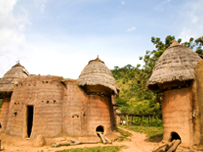
Moreover, up to 500 people were killed in the political violence surrounding the presidential poll, according to the UN. Around 40,000 Togolese fled to neighbouring countries.
President: Faure Gnassingbe Eyadema
Faure Gnassingbe, the son of Togo's late veteran leader Gnassingbe Eyadema, won presidential elections in April 2005, gaining 60% of the votes.
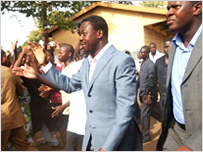
Faure Gnassingbe succeeded his father as president
|
The poll was followed by street violence in the capital involving security forces and opposition supporters, who said the election had been rigged.
The Constitutional Court rejected the claim and a regional delegation said the vote had been broadly free and fair, despite isolated problems.
In 2009, the Togolese authorities claimed there had been a foiled coup plot against President Gnassingbe involving his half-brother and former defence minister, Kpatcha Gnassingbe.
In August 2006 Togo's political parties agreed to form a transitional government of national unity, intended to draw a line under years of violence and instability and to herald parliamentary elections in 2007.
As a first step in implementing the deal, opposition party leader Yawovi Agboyibo was appointed as prime minister in September.
However, the opposition was excluded from the new government formed after President's Gnassingbe's Rally of the Togolese People's won the 2007 election, which was declared free and fair by international observers.
Togo's military installed Faure Gnassingbe as president after his father died in February 2005. The opposition and some African leaders described the succession as a military coup. Under strong international pressure Faure Gnassingbe stepped down and called the election.
Since the late 1990s there has been a proliferation of privately-owned media outlets. There are dozens of commercial and community radio stations and weekly newspapers, as well as a handful of private TV stations.
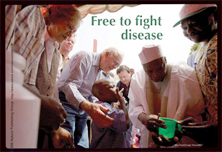
It's been 20 years since William Campbell visited the small nation of Togo
|
However, many private media firms have shaky finances and lag behind their state-owned counterparts in terms of advertising revenue.
Radio is the most popular medium, particularly in rural areas. Around 80 stations were on the air by late 2006.
The main TV station is government-owned Television Togolaise, the only daily newspaper is government-owned Togo-Presse, and some private radio stations are government-owned or associated with the ruling Rassemblement du Peuple Togolais (RPT).
Although the constitution provides for freedom of the press, the government does not follow this in practice. Politically-motivated attacks on journalists, police raids on news stands and printing presses, and closures of radio stations are some of the ways in which the state controls the flow of information, according to media freedom groups.
Under an amendment to the 2002 media law, press offences cannot be punished by imprisonment.
The BBC is available in the capital on 97.5 FM. Also on air in Lome is Gabon's Africa No 1. Radio France Internationale broadcasts on FM in Lome and Kara.
The internet is poorly developed as a medium; the few cyber-cafes have slow connectivity.
The press
Television
Radio
News agency/internet
letogolais.com - online news

AFRICA | ASIA-PACIFIC | AMERICAS | EUROPE | MIDDLEEAST | SOUTHASIA
![]()
![]()
![]()
Mauritania Mauritius Morocco Mozambique Namibia Niger Nigeria Republic-of-congo Rwanda Sao-tome-and-principe Senegal Seychelles Sierra-leone Somalia South-africa Sudan Swaziland Tanzania The-gambia Togo Tunisia Uganda Australia Brunei Burma Cambodia China East-timor Fiji Indonesia Japan Kazakhstan Kiribati Kyrgyzstan Laos Malaysia Marshall-islands Micronesia Mongolia Nauru New-zealand North-korea Palau Papua-new-guinea Samoa Singapore Solomon-islands South-korea Taiwan Tajikistan Thailand The-philippines Tonga Turkmenistan Tuvalu Uzbekistan Vanuatu Vietnam Antigua-and-barbuda Belize Bolivia Brazil Canada Chile Colombia Costa-rica Cuba Dominica Dominican-republic Ecuador El-salvador Grenada Guatemala Guyana Haiti Honduras Jamaica Mexico Nicaragua St-kitts-and-nevis St-lucia Suriname Trinidad-and-tobago Uruguay Venezuela Albania Andorra Armenia Austria Azerbaijan Belarus Belgium Bosnia-hercegovina Bulgaria Croatia Cyprus Czech-republic Denmark Estonia Finland France Georgia Germany Greece Hungary Iceland Ireland Italy Latvia Liechtenstein Lithuania Luxembourg Macedonia Malta Moldova Monaco Montenegro Norway Poland Portugal Russia San-marino Serbia Slovakia Slovenia Spain Sweden Algeria Egypt Iran Iraq Israel-and-palestinian-territories Jordan Kuwait Lebanon Libya Mauritania Oman Saudi-arabia Sudan Syria Tunisia United-arab-emirates Yemen Afghanistan Bangladesh Bhutan India Nepal Pakistan Sri-Lanka The-Maldive